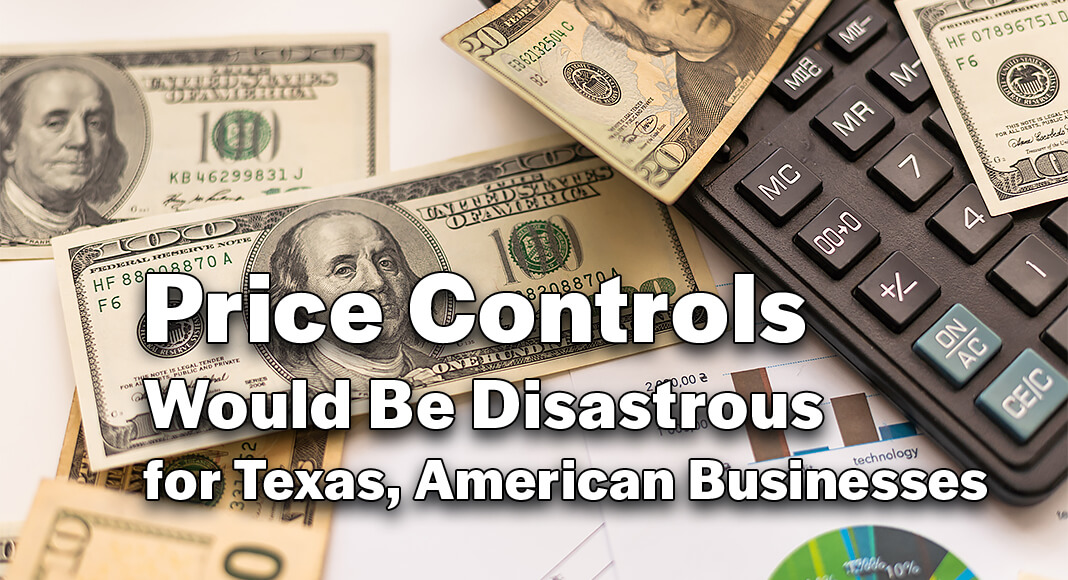
Texas Border Business
Texas Association of Business
Texas is the healthiest economy on the planet, a testament to the dedication of our businesses, the commitment of our workers, and the power of free-market principles. However, Vice President Kamala Harris’ proposal to grant the federal government expansive new authority to control food and grocery prices poses a radical and unprecedented threat to our economic success. If put into place, this policy would be detrimental to businesses across Texas and the United States of America.
Price controls are not the solution to our economic challenges. In fact, they are among the most dangerous ideas being floated in Washington today. The Biden-Harris administration’s policies have already fueled inflation, driving prices higher and eroding the purchasing power of hard-working Texans and all Americans.
On Vice President Harris’ price control proposal, the business community is clear: “It’s not us, it’s you.”
Instead of addressing the root causes of this inflation—excessive federal spending and a regulatory regime that punishes domestic production—Harris wants to impose price controls that would exacerbate the problem and devastate our economy. As Governor Abbott recently pointed out:
“Kamala now wants the government to control the prices that her policies caused to skyrocket. Government price fixing is a proven failure. The fix is to stop the trillion dollar government spending that causes the price of everything to go up—from gas to groceries to housing.”
The idea of using price controls is truly radical. It represents an unprecedented level of government intervention in the marketplace, one that would harm the very businesses that are the backbone of our economy. Businesses are not the problem – they are the solution. They are the producers who keep our shelves stocked and our economy moving forward, despite the challenges posed by inflation and regulatory overreach.
Walter Russell Mead, a professor and Wall Street Journal columnist, offered a particularly scathing critique of Harris’s proposed policy on his podcast this week :
“I don’t think she’s going to be able to get much done. Congress would have to pass this, and I think even if the Democrats control both houses of Congress, there are actually enough congressmen who are either from Ag states, where this won’t be a particularly popular idea, or who cling to some tiny remaining shred of economic intelligence and logic who realize this is about the stupidest idea anybody’s put on the national scene in a very long time.”
As Mead made clear, it’s not just a matter of partisan opposition; even within the Democratic Party, there would likely be significant resistance on the basis that this is simply poor economic policy. Undermining the free-market principles that have sustained our nation for decades in such a sweeping manner would be disastrous for businesses everywhere.
Senator Mike Lee from Utah also succinctly captured the issue, stating:
“Rather than address the actual problem (excessive spending and regulation) in a way that would keep inflation in check, Kamala Harris plans to paper over the problem—and thereby make it worse—by instituting price controls…When government caps the price of anything, it reduces the incentives of those who produce (or might decide to produce) that thing. Consequently, any product subject to price controls will ultimately become more scarce—because fewer people will be incentivized to produce it.”
Senator Lee’s statement encapsulates the core issue: price controls distort market incentives. By artificially suppressing prices, they discourage production, leading to shortages and, paradoxically, even higher prices in the long run. This economic principle has been proven to fail and wreak havoc time and again throughout history, from ancient Rome to modern Venezuela.
We remain confident that Congress would never pass such a draconian measure, however, we must stay vigilant against potential administrative actions that could achieve similar ends without proper oversight. The use of agencies like the Federal Trade Commission (FTC) to implement price controls would be a dangerous circumvention of the legislative process. The impact of the FTC’s egregious overreach isn’t hard to imagine, as the agency’s recent rulemaking on non-compete agreements was halted by a federal judge last month, thanks to the efforts of Texas Association of Business (TAB) member company Ryan, LLC. In her ruling, Northern Texas District Court Judge Ada Brown rightly pointed out that “the role of an administrative agency is to do as told by Congress, not to do what the agency think[s] it should do.”
At TAB, we will remain fierce defenders of the Lone Star State’s business community, and that means we staunchly oppose the idea of price controls. This would be an assault on our free-market system, and we cannot stand idly by while such a threat is posed to our economy.
Instead of resorting to heavy-handed government intervention, we urge policymakers to focus on addressing the underlying causes of inflation. This includes reining in federal spending, streamlining regulations to encourage domestic production, and creating an environment where businesses can thrive and innovate.
Texas has the best business climate in the galaxy, and we have shown time and time again that a free-market approach, coupled with smart, pro-business policies, leads to a thriving economy that benefits all who live and work in our great state. For economic policy that truly creates prosperity, the U.S. should be looking to Texas – not California on steroids – as an example. We don’t need unprecedented, unsound, and unnecessary government policies undermining our hard-earned success.
– Glenn Hamer, President & CEO, Texas Association of Business



